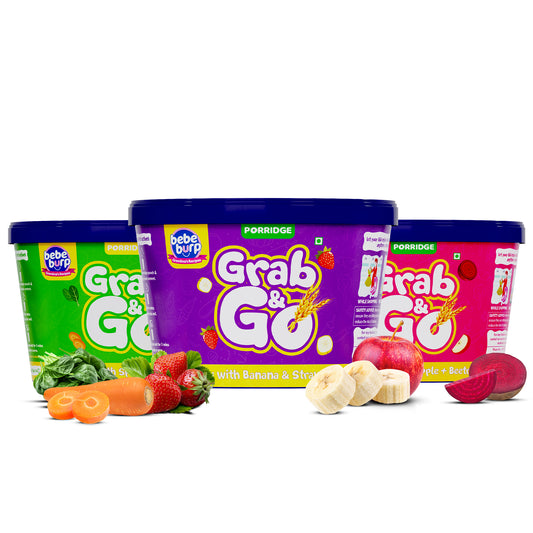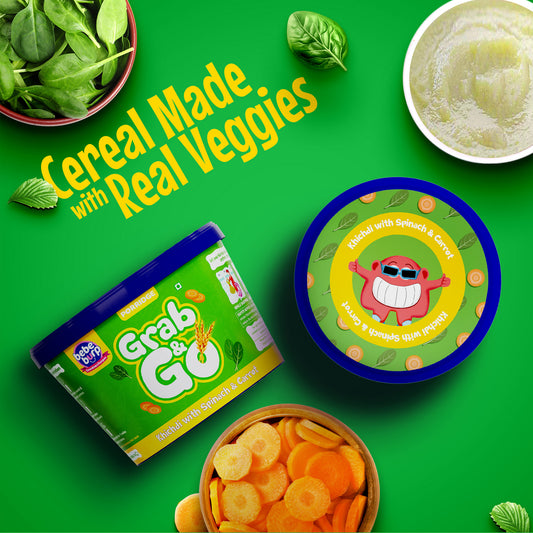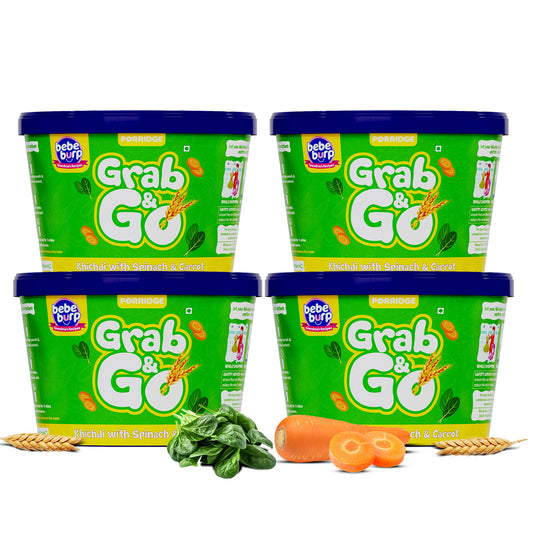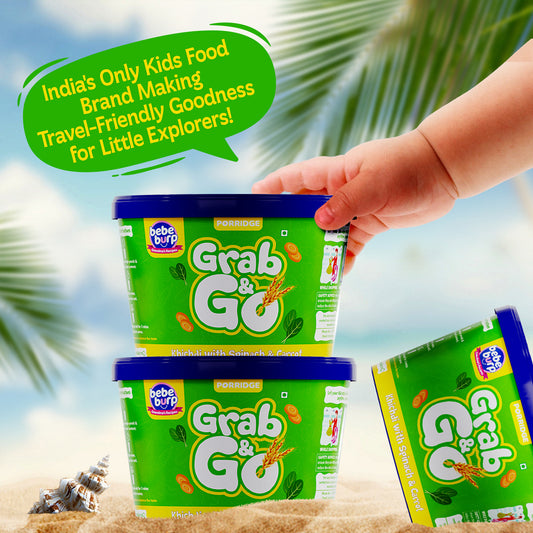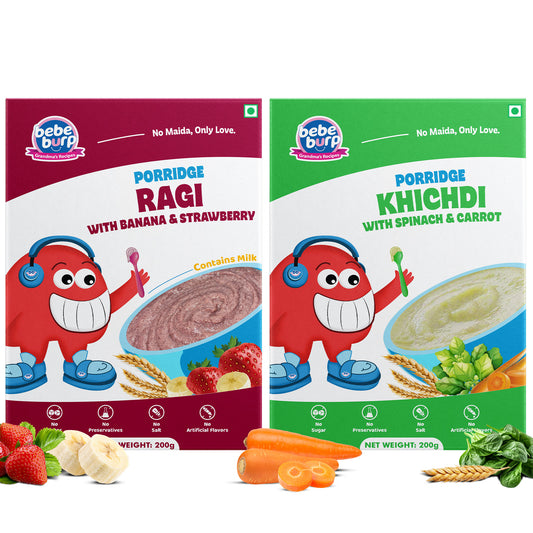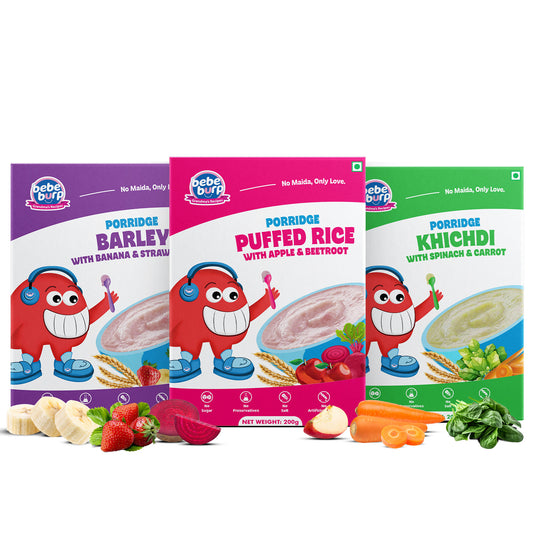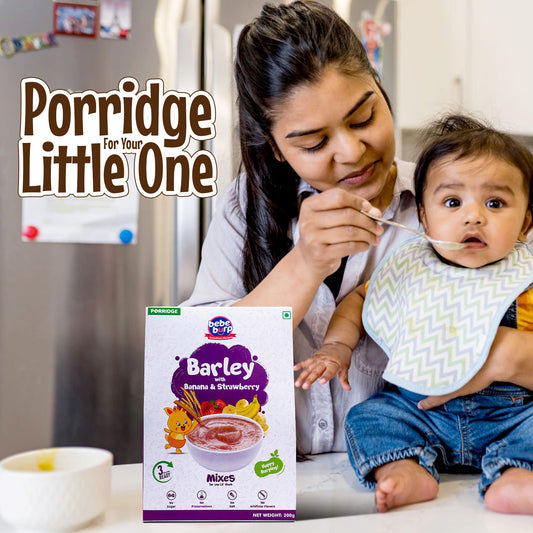At 18 months, your child’s appetite expands beyond milk and basic snacks.
They start enjoying new flavors and textures, making 18 months baby food choices essential for balanced nutrition and growth.
This food chart offers wholesome meal ideas to keep them nourished and satisfied throughout the day.
Why a Dedicated Food Chart Matters for 18-Month-Olds
Your toddler needs proper nutrition at 18 months for active growth and intellectual development.
When following a structured food chart, children obtain essential nutrients while their eating habits develop in a healthy direction while discovering multiple food flavours.
18 Month Baby Food Chart
|
Meal Time |
Food Options (Variety for Nutrition) |
|
Early Morning (6:30 - 7:00 AM) |
Warm water / Soaked almonds (chopped) / Warm milk with dry fruits |
|
Breakfast (8:00 - 8:30 AM) |
1. Oats porridge with mashed banana 2. Ragi dosa with coconut chutney 3. Vegetable upma 4. Moong dal cheela with curd 5. Scrambled egg with whole wheat toast 6. Poha with peanuts and veggies 7. Idli with sambar |
|
Mid-Morning Snack (10:00 - 10:30 AM) |
1. Seasonal fruit (banana, apple, pear, or papaya) 2. Handful of dry fruits (raisins, almonds, cashews - finely chopped) 3. Homemade fruit smoothie (banana + yogurt) 4. Cheese cubes or paneer fingers 5. Boiled sweet potato or carrot sticks |
|
Lunch (12:30 - 1:00 PM) |
1. Dal-rice with ghee and mixed veggies 2. Roti with mashed dal and curd 3. Vegetable khichdi with a dollop of ghee 4. Curd rice with cucumber 5. Soft paratha (aloo/methi/gobi) with yogurt 6. Chicken or fish with mashed rice 7. Dalia khichdi with vegetables |
|
Evening Snack (4:00 - 4:30 PM) |
1. Banana or apple milkshake 2. Roasted makhana (fox nuts) 3. Boiled egg with a pinch of salt 4. Sprouts chaat (lightly mashed) 5. Homemade whole wheat biscuits 6. Ragi malt with jaggery |
|
Dinner (7:30 - 8:00 PM) |
1. Soft chapati with dal and curd 2. Vegetable daliya with ghee 3. Moong dal khichdi with veggies 4. Lightly spiced soup (tomato/carrot/beetroot) 5. Oats porridge with dry fruits 6. Rice with lightly spiced chicken stew 7. Millet dosa with coconut chutney |
|
Bedtime (9:00 - 9:30 PM) |
Warm milk / Mashed banana / Light fruit puree |
Understanding Daily Nutritional Needs

An 18-month-old child requires both essential macronutrients plus essential vitamins together with minerals to achieve total growth development.
Ensure your child's diet includes:
- Whole grains like oats, wheat, and millet
- Protein-rich foods such as lentils, eggs, and dairy
- Healthy fats from nuts, seeds, and ghee
- Fruits and vegetables for vitamins and minerals
Planning Balanced Meals
A nutritious diet requires people to follow scheduled meal times while controlling their serving portions.
Each day should provide three main meals together with 2-3 nutritious tidbits that feature various healthy components.
Incorporating Variety While Ensuring Safety
Provide diverse flavours as well as textures while serving food in small, manageable pieces for protection against choking incidents.
Your diet should include no processed items while avoiding both excessive salt and sugar.
Best Diet for Kids: Key Nutrients for 18-Month-Old

- Calcium & Vitamin D – Dairy, ragi, fortified cereals
- Iron & Protein – Lentils, spinach, eggs
- Healthy Fats – Nuts, ghee, coconut
- Fiber & Vitamins – Fruits, vegetables, whole grains
Best Healthy Food for Kids: Practical Tips
- Cook fresh, homemade meals
- Avoid processed and high-sugar foods
- Include seasonal fruits and vegetables
- Self-feeding encourages the development of motor skills in children.
Addressing Common Concerns
Q1) Welcome to the challenge of feeding an unwilling eater.
Ans: Provide confusing dining options in various food combinations and prepare attractive presentations for the meal.
Q2) I need to develop methods to help my child meet nutritional requirements.
Ans: Food consumption should combine protein sources with carbohydrates and health-oriented fats.
Q3) I can provide my child with cow's milk in limited amounts but only two cups per day.
Ans: Two cups of milk daily is acceptable to prevent iron deficiency except in moderation.
Conclusion
Your toddler requires a proper balance of nutrients for proper growth and development.
Maintain fresh, homemade, and nutrient-dense meals with no processed foods and minimal sugar.
The food chart serves as guidance, but you should customize it to fit your child's food preferences.


